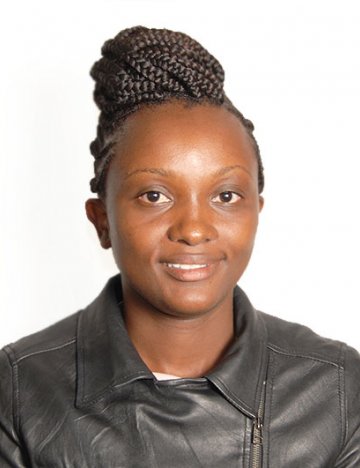Laura Kavata Kimwele, Community Development Advisor
Laura has been working with Brooke East Africa since 2014 in the field of animal welfare, spearheading community development work across the region. She directly provides advisory and mentorship support to our partners and related institutions in order to improve equine welfare and have a thriving equine community.

Laura is a behaviour and social change champion in:
- Advising and assuring quality programming that delivers sustainable change among equine-owning communities
- Monitoring and reporting on impact from communities that results in improved animal welfare
- Strengthening community-based structures for sustainable programming and a capacity building lead in community engagement work
Qualifications
- Bachelor of Arts in Community Development from Daystar University
- Currently pursuing a Master of Project Planning and Management from University of Nairobi
Laura discussing the ‘Use of Human-Based Indicators to Assess Adoption of Improved Husbandry Practices’ to improve animal welfare among equine owners in Kenya. This was during The First International Conference on Human Behaviour Change for Animal Welfare, which took place 19-21 September 2016 in Dorking, Surrey, UK.
- Kavata, L. (2020). Effects of the donkey hide trade on the livelihoods of women in Kenya. Brooke, Action for Working Horses and Donkeys. Available here.
- Kavata, L. (2019). Kenya without donkeys — is it the end of gender equality? Medium. Available here.
- Madara, Kavata, Mithigi & Compston. (2017). Understanding donkey branding in the Maasai communities of Narok and Kajiado, Kenya. Brooke, Action for Working Horses and Donkeys. Available here.
Hobbies
Travelling, reading and cooking.
Laura leading discussions on cart and harness improvements with Brooke partner staff from Kenya, Tanzania and Somaliland during a cross-partner share-and-learn community visit.
Witnessing the development of the current Brooke Theory of Change. The vital role played by thriving communities in improving animal welfare has been a key pillar in designing sustainable community engagement projects in our work. The revocation of donkey abattoirs as export by the government in February 2020 is a big win for the equine-owning communities; we remain hopeful that this will stand the test of time. It’s been sad to see the communities unable to meet their household needs due to theft/loss of their donkeys. Brooke’s support has been timely in helping them manage during the unfortunate period.
Equine welfare remains a unique niche and I am proud to contribute to the mission and vision of Brooke.
Best part of your job
Sharing my expertise with, mentoring and supporting community development staff and equine owners to develop practical and innovative ideas, and successfully being adopted to address the ‘hard-to-win’ community practices that affect equine welfare, gives a lot of satisfaction. This requires creativity, good analytical skills and teamwork in designing and testing community engagement strategies and suitable and applicable approaches, given the diverse context that we work with across the East Africa region. Equine welfare remains a unique niche and I am proud to contribute to the mission and vision of Brooke.
Laura demonstrating the application of participatory rural appraisal (PRA) tools for use in the animal welfare field during a Brooke East Africa partner staff training.
It was a thorough and competitive interview. Having a Bachelor’s Degree in Community Development Studies with development work and strong field practice in community programme development, implementation, monitoring and evaluation matched with my technical and relevant experience I have in working with local and international organisations in the fields of livelihood and resilience, food security, climate change and community advocacy.
On 10 July 2020, Brooke held at a side event at the High Level Political Forum on Sustainable Development on ‘Strengthening animal health systems to accelerate progress towards SDGs’, featuring speaker Laura Kavata.
